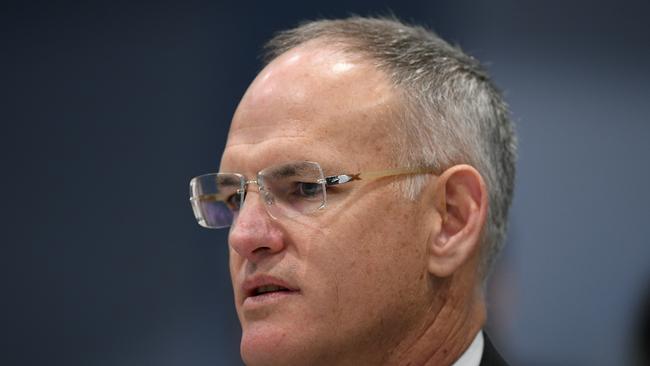
Their extraordinary profits are based on their unfair commercial exploitation of other people’s content — and powerful legislative changes are needed to correct this imbalance.
Platforms like Google should be banned from using content produced by publishers and the data generated from it until they negotiate a fair price for their use with publishers. News Corporation has made this point strongly in its submission to Treasury, which is currently considering the government’s response to the Australian Competition & Consumer Commission’s digital platforms inquiry.
The government’s response to the ACCC’s recommendations comes as the impact of the tech titans’ behaviour is now very real. Without swift action, more jobs will be lost and more communities will lose valuable sources of information. This pain is particularly stark for independent publishers. Similarly, the platforms have sought to frustrate media companies building subscription services to fund their journalism, as alternatives to giving away content for free and being reliant primarily on advertising, so much of which has been diverted to the platforms themselves.
News Corp’s submission outlines a blueprint for how Australia can show global leadership. However, we shouldn’t delude ourselves about the forces at play here. Be warned. We are already seeing intense lobbying from the likes of Google to present themselves as friends of journalism, an industry where they’ve sucked the life out of so many publishers while profiting from their content.
Don’t be fooled by their smokescreens: their sole aim is to convince lawmakers against curtailing their largely unregulated market dominance.
It’s guaranteed that when governments threaten intervention, the platforms make hollow promises — ones that make publishers sceptical.
On Friday in the Australian Financial Review, Google chief executive Sundar Pichai made all the usual promises of working with publishers before making it clear Google opposed any ACCC attempt for oversight of Google’s commercial dealings with media companies. Again in the AFR recently, Melanie Silva, managing director of Google Australia, had glowing praise for Google’s effort of sending billions of clicks from users to Australian news publishers, and the changes to its secretive algorithms to better recognise original reporting in search. It all sounded rosy until she revealed a now familiar theme: Google opposes ACCC proposals for what she calls “regulator-sanctioned negotiation of revenue sharing between platforms and news publishers”.
Similarly, another Google executive claimed recently “we don’t accept payment from anyone to be included in search results” — except it does; search for almost anything and you’re bound to see a paid ad as the top result. “We’re committed to playing our part in ensuring a successful and sustainable future for news,” he also said, but if the word “playing” was actually “paying”, then Google’s commitment might mean something. As it stands, among the biggest beneficiaries of Google’s platform are publishers of news that’s fake, not factual.
Google simply wants to continue exploiting and profiting from publishers’ content for free and has little interest in compensating publishers fairly. Other tech giants have begun to see the light — Facebook reportedly has engaged in serious negotiations with media companies as it begins to fashion a new news tab using premium content. And there are signs that governments around the world have woken to the societal and economic damage wrought, as evidenced by actions undertaken in Australia, the UK, the EU and the US.
It is in light of such official inquiries, and to encourage even more co-operation between the platforms and publishers, News Corp welcomes the ACCC’s recommendation for a specialist digital platforms branch to monitor proactively potentially unfair and anti-competitive practices. Platforms such as Google have substantial market power in dealings with media companies because they are unavoidable trading partners. A specialist ACCC branch could enforce competition and consumer laws by monitoring how digital platforms’ algorithms rank and distribute news content and advertising to consumers, and act if they are anti-competitive.
News Corp also believes the ACCC’s proposal to establish codes of conduct for digital platforms is a wise move but the ACCC, not the Australian Communications and Media Authority as recommended, should regulate them because of its competition expertise.
To ensure platforms comply, the government should legislate minimum standards requiring they are fair and transparent in negotiations with publishers, prohibit anti-competitive or discriminatory practices and stipulate real consequences for non-compliance. The legislation would prohibit platforms using any publisher’s content and from collecting any data generated by use of that content unless all publishers (or the major ones) have negotiated and entered into agreements with them. Otherwise, platforms can continue to play publishers off against each other to force them to take it or leave it on use of and payment for content and use and provision of data.
Further, News Corp supports an ACCC inquiry into supply of ad tech services, an opaque environment where intermediaries with market power engage in predatory conduct that leads to less competition, higher prices for advertisers and fewer revenues for publishers. The ACCC has identified that owners of media websites can be considered competitors to digital platforms for supply of ad inventory but are also reliant on platforms like Google, which offers ad services that assist websites to sell their ad inventory.
This has had a serious impact on publishers’ advertising revenue particularly because digital advertising revenues have not offset the dramatic decline in print income. There are at least two reasons for that — both related to the platforms’ extraordinary power.
First, digital ad growth is almost entirely captured by big tech platforms, not least because of the vast troves of user data protected within their walled gardens. Second, Google has effectively strengthened that wall by monopolising ad serving and intermediation services for ads placed on the open web, on which publishers rely to monetise their inventory. As recognised by the ACCC, Google has the ability and incentive to leverage its power to preference its own services and foreclose other publishers and competing ad tech services.
Google’s advertising dominance not only crushes would-be competitors, it forces anyone wanting to build a business in Australia to play by its rules just like inmates locked in a prison.
One issue raised by the ACCC — a harmonised media regulatory framework — would be counterintuitive. Regulatory design should be about a principled examination of regulating the unregulated, not re-regulation of existing print and online media. Australian companies should not be at a disadvantage against multinational platforms not subject to regulation.
Another important challenge is infringement of copyright on digital platforms, particularly with live streaming of sport. However, ACCC’s call for a mandatory take-down code would not be the best approach. Instead, misuse of copyrighted material must be combated proactively by amending the Copyright Act to make platforms liable for infringing content on their platforms. Until they are liable, they will not change their behaviour.
These are critical issues. How the government responds to the ACCC’s recommendations will have a profound effect on our media: it is vital we get this right for all Australians.
Michael Miller is Executive Chairman of News Corp Australasia.




We should be clear from the outset: no one has damaged journalism and Australians’ ability to receive trusted, reliable information more than the big tech platforms.